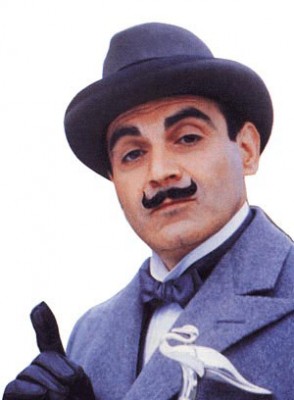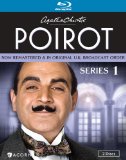| Reviews & Columns |
|
Reviews DVD TV on DVD Blu-ray 4K UHD International DVDs In Theaters Reviews by Studio Video Games Features Collector Series DVDs Easter Egg Database Interviews DVD Talk Radio Feature Articles Columns Anime Talk DVD Savant Horror DVDs The M.O.D. Squad Art House HD Talk Silent DVD
|
DVD Talk Forum |
|
|
| Resources |
|
DVD Price Search Customer Service #'s RCE Info Links |
|
Columns
|
|
|
Agatha Christie Poirot - Series 1
For those who've been trying to keep pace with these things, Acorn's latest move will be a blessed relief. I tried unraveling this mess of multiple distributors and myriad reissues in this earlier review, though much has come along since then. If you've held off so far, this is where you'll want to begin. Moreover, if you're a big Poirot fan, you shouldn't be disappointed by this uncluttered, attractive release.
Almost three years ago I reviewed a new Blu-ray release of Pride and Prejudice, the 1995 British miniseries that, like Poirot, had been shot in 16mm, as was common practice then. Watching that amazing transformation from its icky, soft and discolored TV broadcast version to stunning high-def was a revelation. Who knew something shot in 16mm could look that good in high-def, magnified on big screen TVs? Yes, grain was visible but the results were remarkable. At the time I predicted that it was only a matter of time until Poirot, Inspector Morse, and the Jeremy Brett Sherlock Homes series (all internationally popular shows) enjoyed the same revitalization. More on this below.
Sadly, the set is absolutely bare bones. You get the shows with optional (English) subtitles and that's it. Considering its popularity, you'd think a retrospective featurette with members of the cast and crew and a few audio commentaries, especially with Christie scholars comparing the shows with their literary sources, would be in order. No matter. The shows look great and each is a little gem.
The clumsily-titled Agatha Christie Poirot (Why no apostrophe?) followed an initially acclaimed and popular (if diminishingly so) series of films, first starring Albert Finney (in Murder on the Orient Express, 1974) and later Peter Ustinov (in three theatrical features followed by three more TV movies). These seven projects began spectacularly but their quality evaporated long before the last one, Murder in Three Acts, which aired in 1986, three years before the Suchet series began.
Undoubtedly inspired by the great popularity of the Finney and first two Ustinov films, as well as the instant worldwide success of the Jeremy Brett Sherlock Homes series (1984-94), which sought to create lush yet faithful adaptations of Sir Arthur Conan Doyle's iconic detective, a new Poirot series must have seemed like a sure bet.
The best decision its creators made was in casting actor David Suchet. So dedicated to the role was he that Suchet immediately read every Poirot short story and novel, assiduously taking exhaustively detailed notes that would've done Miss Lemon, Poirot's famously well-organized secretary, proud. Overnight Poirot became Suchet's signature role, just as Holmes had become for Jeremy Brett. A final series, wrapping up the entire Poirot canon, has been announced for this year, concluding with the final Christie-Poirot story, Curtain. In the history of film and television, there's never been anything quite like Suchet's long and admirably dedicated association to a single fictional character. (Wrong: And how could I miss it? As Sergei Hasenecz points out, James Arness played Matt Dillon for 20 seasons and later TV movies over the span of 39 years.)
Watching these earliest Poirots again - "The Adventure of the Clapham Cook," "Murder in the Mews," "The Adventure of Johnny Waverly," "Four and Twenty Blackbirds," "The Third Floor Flat," "Triangle at Rhodes," "Problem at Sea," "The Incredible Theft," "The King of Clubs," and "The Dream" - several observations immediately come to mind.
The first is the sharp contrast between these efficient, humor-laced mysteries with the often frenetic, overcooked, and largely humorless Poirot television movies of recent years. Second, and hand-in-hand with this first observation, is the great pleasure of watching Poirot's interaction with supporting players Captain Hastings (Hugh Fraser), Chief Inspector Japp (Philip Jackson), and the aforementioned Miss Felicity Lemon (Pauline Moran). All three abruptly vanished from the series in 2001 (their last episode was Evil Under the Sun)*. I've yet to learn definitively the reason behind this. Perhaps it was a budgetary decision, perhaps a creative one. All three were phased out of Christie's later Poirot novels, though one or more don't appear in some of the stories presented here, and the later novels have incorporated another character, Ariadne Oliver (Zoë Wanamaker) into stories where she doesn't belong. Whatever the reason the vast majority of Poirot fans miss them enormously and are very vocal in their complaint. At the same time the series became increasingly darker in tone, even when the source material didn't demand it. Also, the newer TV movies tend to be less faithful to the original stories and, occasionally, are seriously marred by over-stylized, attention-grabbing direction.
Not so here. Each of the ten shows offers compact little mysteries that feel neither padded nor abbreviated. Each of the three characters serves an important function in these stories, too: Hastings, an Art Deco and slightly dimmer Watson, emblematic of the British leisure class and easily distracted by his love of sports cars and cricket, yet a loyal friend; Japp, Christie's Inspector Lestrade, more or less, but wiser and more respectful of Poirot's talents, if no less crude; Miss Lemon, the dedicated and incredibly efficient secretary, who also knows when to intervene on her boss's behalf.
The series is gently amusing in ways lost on the current group making the series now. During this series, Poirot is, like the '70s films, aware of its drawing room-like antiquatedness, and more or less acknowledges its character and period stereotypes (something more obvious to British than American viewers, I imagine). It amusingly counters this with humorous hindsight, by sometimes making wealthy industrialists and lowly charwoman alike openly prejudiced toward Poirot's "foreignness," usually mangling the pronunciation of his name in the process.
All ten shows in this set are very good to excellent. "The Third Floor Flat" may be the best of the lot, partly for its ingenious simplicity, but also for humorous scenes that find Poirot and Hastings at a Christie-like stage play, where to his unending embarrassment Poirot incorrectly guesses the murderer's identity.
Video & Audio
Series 1 of Poirot was shot with Panaflex-16(mm) cameras and rightly presented here in 4:3 format. (Pride and Prejudice was shot in Super-16, which accommodated a 1.66:1 aspect ratio, which is why that's widescreen on Blu-ray.) It appears that portions of the abstract opening titles may have been reconfigured for high-def, with other portions of the title elements, those that couldn't be recreated, were left as is. The rest of the show just sparkles, however. Colors are truer and much more detail is visible. And yet an eye-pleasing amount of film grain is still visible; there's no obvious attempt to artificially sharpen anything with DNR.
The 2.0 Dolby Digital mono is perfectly adequate, as are the SDH subtitles. The ten shows are presented on two discs, five episodes per. No Extra Features.
Parting Thoughts
This is an unmissible set of mysteries, now thankfully in broadcast order, neatly arranged, in high-definition to boot, and a major upgrade from earlier DVD versions. Extra features would have softened the blow to one's wallet, but it's Highly Recommended nonetheless.
* Hugh Fraser's Captain Hastings is expected to return for Curtain (2012?), though this is unconfirmed.
Stuart Galbraith IV's audio commentary for AnimEigo's Tora-san, a DVD boxed set, is on sale now.
|
| Popular Reviews |
| Sponsored Links |
|
|
| Sponsored Links |
|
|
| Release List | Reviews | Shop | Newsletter | Forum | DVD Giveaways | Blu-Ray | Advertise |
|
Copyright 2024 DVDTalk.com All Rights Reserved. Legal Info, Privacy Policy, Terms of Use,
Manage Preferences,
Your Privacy Choices | |||||||















